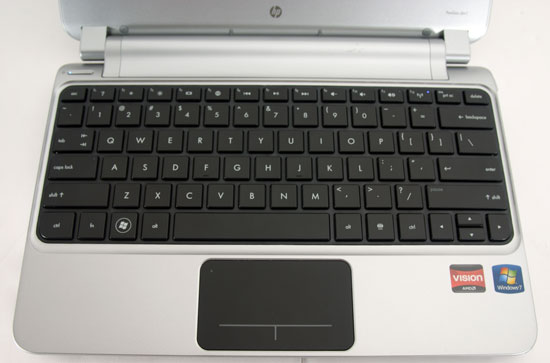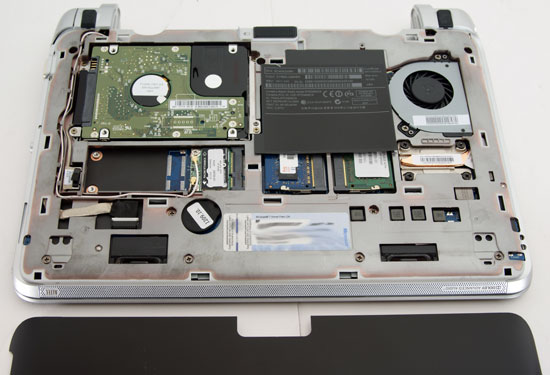HP dm1z: Taking Fusion on the Road
by Dustin Sklavos on February 21, 2011 7:00 PM ESTThe Swankiest Netbook You Ever Did See
First we should make one thing clear: the HP dm1z is basically small enough and slow enough to be considered a netbook, with most of the good and bad connotations that term brings with it. With that in mind, the dm1z is a remarkably attractive piece of kit and as you'll see, in many ways it feels like the netbook finally arriving at about the form factor and performance level it always needed to be at.
The lid of the dm1z is a textured black plastic that is a healthy stride away from the glossy plastic hell that used to plague HP's older models; it's attractive and doesn't easily pick up fingerprints and smudges, and the HP logo is nice and subdued in the lower corner. There's a silver trim that extends around the lid and into the body.
When you pop open the dm1z, you'll see that trim matched with silver matte plastics on the screen bezel and tastefully framing the keyboard and touchpad. HP has made some really great strides as of late in improving the looks of their notebooks, and the dm1z continues that trend. The silver plastic is used for the interior surface along with the battery and rim of the system and is complemented by sparse usage of white LED indicator lights.

HP has been pushing a standardized chiclet-style keyboard across all of their lines at this point, and it suits the dm1z. The 11.6" form factor allows HP to squeeze a comfortable full-sized keyboard into the unit, too, with the document navigation keys helpfully and logically mapped to Fn+arrow key combinations. The keys aren't marked that way, but it's easy enough to figure out. There's no number lock either, but I've never found the 10-key wrangled onto the main keyboard to be particularly useful. The only complaints about the keyboard are minor ones: HP, like Dell, opts to default the function keys to controls and shortcuts (though this can be toggled in the UEFI), and the left and right arrow keys are basically double-sized compared to the up and down arrows. On the whole, though, this is a solid netbook keyboard that most people should be very comfortable with.
The touchpad is more of a mixed bag, but kudos to HP for actually using a separate piece of plastic for it instead of just building the sensor into the inside panel. Of course, there's a reason for that: HP is using the same clickpad that's dogged their mainstream notebooks over the past year. To be fair the HP implementation is among the better ones used for Windows-based systems, it's multitouch capable, and the tracking surface is comfortable, but we would still rather see dedicated buttons on future refreshes. If you're using an external mouse or keep brushing the touchpad (not a problem I had in testing it), you can actually double-tap the top left corner of the touchpad with your finger to disable it; a pinpoint orange LED will glow when the touchpad is disabled.

One of my favorite features of the dm1z is actually on the bottom. HP has gone a long way towards simplifying user upgrades by simply putting one large, screwless panel on the bottom of the unit. The panel simply snaps on and off and feels both sturdy and user-friendly while also making the dm1z as a whole more attractive by hiding serial numbers and the Windows key. As you can see, everything you'd want to upgrade is easily accessible.
Taken as a whole I'll admit to being fairly smitten by the dm1z's design. It's remarkably well streamlined and clearly designed to improve the user experience while avoiding looking too chintzy or cheap. This is definitely one of the best-looking netbooks I've ever seen and it feels very solid.
















108 Comments
View All Comments
JarredWalton - Tuesday, February 22, 2011 - link
11.6" is close enough to netbook size that I have no issues calling it a netbook. I typically call 11.6" to 13.3" ultraportable, 10.1" and smaller netbook, 14-15.6" laptop, and 16" and larger notebook. However, notebook and laptop are almost terms that reflect the entire category of mobile computer, and netbook can just as easily mean "slower, smaller, and with good battery life" as it can "less than 10 inches".The Crying Man - Wednesday, February 23, 2011 - link
I thought 10" and under was a Microsoft restriction with regards to which edition of Windows OEMs could install. In the case of netbooks, they could only install Starter. Which is why I think HP, in another review, insisted that this isn't a netbook.Zoridon - Tuesday, February 22, 2011 - link
I bought my wife a ASUS 1000HE about 2 years ago. It came with a atom 280 1.66 ghz processor, 160 gig hard drive, intel onboard graphics and 1 gig of ram for about $380. It had a 10.1 inch 1024x600 screen and bluetooth. My compliants were many and I tried to warn her it would feel slugish after loading xp, antivirus, itunes, and whatever else she found to install. It will now serve as my bitorrent client machine because thats all its really good for, or watching whenever I find myself on a plane.Complaints:
1. Screen does not quite fit an entirew webpage so I have to scroll = wasted time
2. No gaming ability what so ever
3. Lack of flash support
4. Sluggish windows performance once you get a few programs running
This system blows it away in every aspect. Battery life is almost as good,
1. duel core processor that is 50 percent faster per core.
2. twice as much ram or triple as HP has offered
3. Modern windows OS
4. twice the hard drive space and not 5400 rpm
5. flash card reader built in
6. The screen is over an inch and a half larger with enough pixes to fit an entire web page
7. full size keyboard
8. Easy access to inner parts for do it yourself upgrades (RAM, Hard Drive)
All in all this is a hell of a improvement. If I were in the market to buy a computer for mobile use right now I'd buy this in a heartbeat. I can't wait till they go to 2nd generation and upgrade the processor speed to at least 2 ghz and incrementally improve the graphics and add USB 3. Did I mention bluetooth 3.0? I may even suggest the Army take a look at these systems for the SIPR machines (Secret) since we are not allowed to use uptical drives on those systems anyway. MIght as well remove them and have admins have some externals handy for a case by case need.
duploxxx - Tuesday, February 22, 2011 - link
well at least it is available now in some EU parts.large consumer electronic vendors offer now the dm1z with 3gb ram and 320gb hd for approx 380eur, not that bad at all.
Arnulf - Tuesday, February 22, 2011 - link
"Jarred's working on some additional gaming tests for his E-350 review"Once again I implore you to run some older game titles (from 2005 or thereabouts) that Fusion should be able to run at satisfactory FPS rates. Pick the titles that you used as your benchmarks back then so that your readers can see what's actually playable on Fusion platform.
Sub 20 FPS scores in modern games mean nothing (except to masochists perhaps), you've made it clear Fusion is incapable of running any modern game so please take some more time to show us what it *CAN* run.
Shadowmaster625 - Tuesday, February 22, 2011 - link
And dont forget League of Legends. (max settings)pafnucy - Tuesday, February 22, 2011 - link
I have waited for Anand's review of dm1z with anticipation. I am quite disappointed, honestly.1. dm1z ships with HP CoolSense application for balancing noise vs temperature of the system. By wiping the HDD clean and then complaining about the fan noise the reviewer not only displays laziness but also disinforms the readers.
2. Other websites mentioned that the HDD performance is underwhelming. Here, the reviewer instead of running e.g HD Tune for 5 minutes just assumes that it's fast because it ships with a fast drive. For an entirely new platform, especially one that cuts corners to achieve low power consumption, it seems crucial to be wary of potential performance problems.
3. The entire review doesn't even mention sound quality. Are the Lantec speakers any good? What about the audio chip? Is it a part of the platform or something entirely different? 92HD81B1X does not tell me anything at all.
4. The whole point of Fusion on netbooks was to provide a way of using GPU cores to accelerate certain applications and not to play games. And there are more and more application capable of taking advantage of that. What about testing for example Firefox 4 beta (http://hacks.mozilla.org/2010/09/hardware-accelera... CPU usage numbers when video (flash or h264) is played wouldn't hurt either.
JarredWalton - Tuesday, February 22, 2011 - link
Sorry, but several of your points are not accurate. We do not generally do clean installs on laptops; we uninstall useless programs (you know: McAfee, Norton, TrendMicro, and the various tools that don't do anything other than delay the boot speed and pop up at annoying times). The default install was tested, but probably without the HP Support Assistant active (I find that "tool" rather annoying, just like the Lenovo, Dell, etc. equivalents). It was found to be somewhat noisy compared to other laptops, but I've asked Dustin to check results for temps/noise with CoolSense active.As for the HDD, sure, a WD Black is underwhelming relative to SSDs, but compared to the 160GB and 250GB 5400RPM drives found in most netbooks, I can guarantee it does better. HD Tune is a nice synthetic test of HDD performance, but it's not going to cover everything. Finally, this is our first Fusion laptop, and we're working on reviews of others; I'll take a look at some of the other elements you mention in point four in the future. But I can say that 720p Flash video works fine (I haven't checked 1080p yet).
Dustin will have to respond to the sound comment, but if it's like other laptops I've used I expect it is at best serviceable. Anyway, thanks for the feedback; I wish HP would have put the CoolSense into the BIOS rather than in a separate software tool.
Dustin Sklavos - Tuesday, February 22, 2011 - link
Unfortunately I no longer have the unit on hand as I had to send it back.That said, the sound quality seemed pretty decent but you have to remember these are laptop speakers: if speaker quality isn't explicitly stated it's reasonable to assume it's the same middling laptop audio we've come to know and tolerate.
If other websites are underwhelmed by HDD performance, I honestly don't know what would placate them other than an SSD. As far as mechanical drives go, the Scorpio Black is among the fastest. I actually did do some testing on a clean install of Windows and I was amazed at just how snappy the dm1z actually was.
chiadog - Tuesday, February 22, 2011 - link
So the netbook we've been waiting for is too thick, too heavy, and too slow. No thanks. I like the old HP mini's more than this. I rather carry a real notebook at this weight than a half neutered computer.